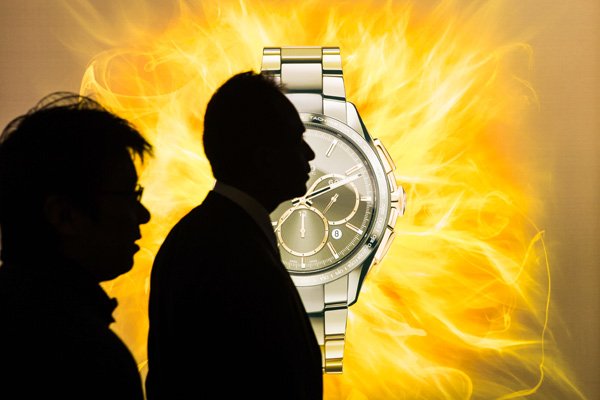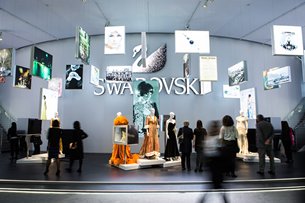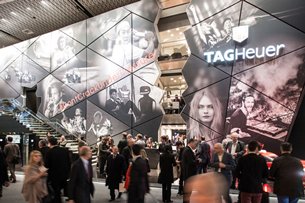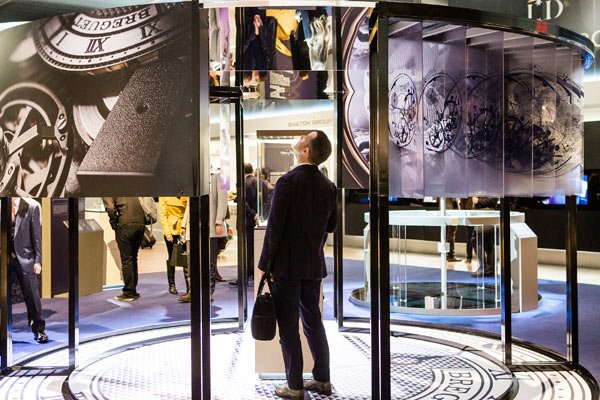
This year's edition saw the event once again live up to its reputation as one of the world's most glamorous trade fairs.The sheer scale of Baselworld could be seen in the size of the exhibitors' stands, which were more like three-storey futuristic buildings, each designed to reflect their brand's prestige. With 2,100 exhibitors from 45 countries fanned out across the town's vast Messe New Hall, attracting nearly 100,000 visitors and 4,000 journalists across the seven days, the VIP factor oozing throughout the site was striking.All of the established players in the watch world had a significant presence – Rolex, Omega, TAG Heuer, Patek Philippe and Blancpain were all within sight of each other. The watches on display at the front of the stands were mere previews for the more exclusive items upstairs. For such a big show, there was surprisingly little in the way of new product launches at Baselworld, with brands seeming to prefer to concentrate on customer interaction and marketing.The talk of the town was, in fact, a product that doesn't even exist yet, with no name and no prototype. TAG Heuer stole the headlines by announcing an unprecedented link up with technology giants Google and Intel, with the intention of launching a new smartwatch. There was precious little detail about the proposed features of the watch, but it is rumoured it will run on an Android-based system, retaining the "feel" of a watch but with subtle "smart" features, such as the ability to connect wirelessly to the internet.The concept of the smartwatch has been around for a while, with Tissot, in particular, integrating various smart technology functions into its watches for climbers and adventurers since the mid-1990s. The same could be said of diving watches, with the Rolex Submariner having led the way. Even sailing watches, such as the Omega Seamaster, are able to stake a similar claim.

Following Apple's much-vaunted entry into the market, however, the concept of the smartwatch has truly taken on a whole new meaning.Switzerland's leading watchmakers will never admit they have been caught out by the pace of technological advances in an industry where they are used to calling the shots. It remains to be seen whether the Apple watch will be in direct competition with more traditional-style timepieces, but it seems inevitable that considerable changes to the market are nigh.Indeed, the present state of the smartwatch industry suggests change has arrived, with the likes of Samsung and LG featuring among the top spots in a fast-growing industry that saw 4.6 million units sold globally in 2014 alone, representing a total turnover of US$1.3 billion. Samsung, with its Gear line of products, is by far the leading player currently, with a 23% share of the market.The other notable feature of the top 10 is the sheer rate of growth. The market increased in size, year-on-year, by 82% in 2014, and four of the year's top 10 smartwatch-producing companies were newcomers, including China's Lenovo/Motorola. Just one brand in the leading pack, Garmin, is Swiss.This year promises to deliver yet more change, with some analysts predicting that the number of smartwatches being sold will grow by as much as 600%, largely due to Apple's eagerly anticipated entry into the market.Perhaps pointedly, none of the aforementioned smartwatch brands were absent at Baselworld. The show, however, remains very much the domain of the somewhat conservative Swiss watchmakers. The state of the traditional high-end watch industry remains healthy, generating US$22.8 billion in turnover in Switzerland alone and accounting for 10.7% of the country's total exports, second only to pharmaceuticals.Growth figures tell a slightly different story, with a relatively sluggish 1.7% increase in exports for 2014, far below the double-digit growth the industry enjoyed in 2011 and 2012. Industry insiders predict, however, that exports will pick up again this year, moving within a more respectable 4%-7% range.At Baselworld, there was little sense of a "crisis" but there was certainly a renewed sense of urgency among some of the more forward-thinking brands. TAG, which stands for "Technique d'Avant Garde", smartly used the show to generate PR and momentum for the aforementioned groundbreaking partnership but it also triggered a discussion about the future of watches.Luxury brand Montblanc and leading watchmaker Breitling have both unveiled watches capable of connecting to smartphones via Bluetooth. The accompanying Breitling app allows users to easily adjust the various settings of the watch using their smartphone's much bigger screen. Both of these watches were on show in Basel.Signs of evolution at Baselworld are, if anything, as subtle as the ticking chronographs lining the walls of the various stands. The trend in conventional watches involves a move away from "complication" movements towards a more simple, refined look. There is also an acceptance of the non-traditional, more fashion-based brands moving into the established Swiss watchmakers' lair, with Chanel, Hermès and Graff all building solid reputations as serious watch brands.With so many journalists and analysts in attendance, opinions about the future of watches were in abundance, but few were prepared to make any solid predictions. The consensus among the various CEOs and Presidents of watch brands could be summed up by Tissot CEO Francois Thiebaud, who stated that customers are "seeking watches that provide more than time". His insight, perhaps, seems a little tame in the context of the arrival of Apple, a company with a proven track record of revolutionising entire markets.The Swiss watchmakers, however, also have a proven track record in beating off challenges to their traditional dominance. It is perhaps worth remembering, though, that two Japanese companies, Casio and Seiko, succeeded in bringing the digital watch to the market in the 1970s and 1980s, upsetting the balance for a considerable time before the Swiss heavyweights reasserted their ownership of the sector.The truth is, as with much of Baselworld, predicting the future of the industry comes down to speculation and educated guesses. The overriding feeling is that the Apple watch will revolutionise the entire industry and that, although the traditional players may be aware change is coming, they are not yet fully prepared to meet that challenge.There will undoubtedly be buyers who will make the choice between either a top Patek Philippe or a US$10,000 gold Apple smartwatch. The smartwatch share of the high-end "wrist" market is certain to grow this year and beyond. No one, though, can truly foresee what this really means for the traditional watch market. Analysts will be closely observing customer behaviour in the coming months as the Apple watch is released around the world.The other important factor is how quickly and efficiently the traditional brands respond. TAG Heuer has made the bold move of allowing its proposed smartwatch to be designed and manufactured in the heart of Silicon Valley rather than in Switzerland, the spiritual home of the luxury watch. A sign, perhaps, of things to come
.


Baselworld 2015 was held in Basel, Switzerland, from 19-26 March.

